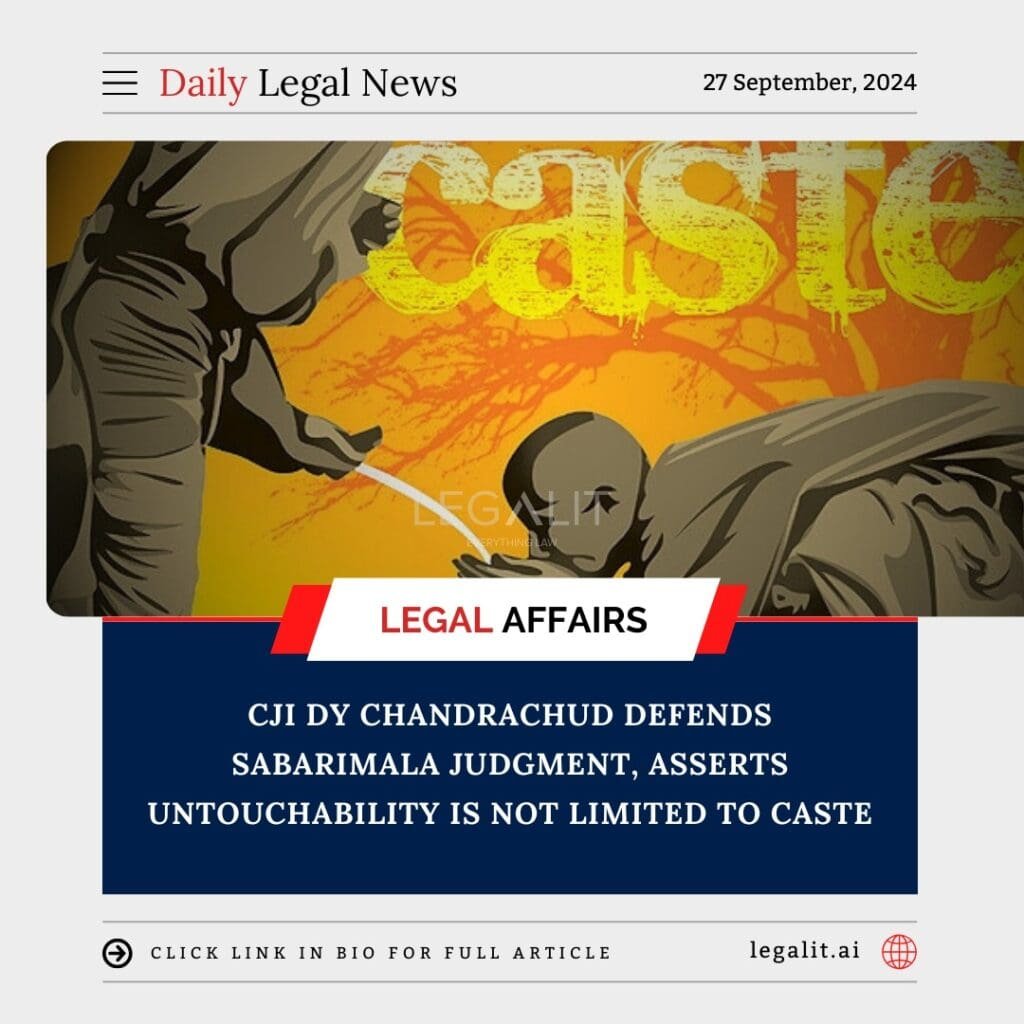
Chief Justice of India (CJI) DY Chandrachud recently defended the landmark Sabarimala judgment, where the Supreme Court allowed the entry of women of all ages into the Sabarimala temple in Kerala. In his remarks, CJI Chandrachud emphasized that untouchability is not confined solely to caste but extends to gender-based discrimination as well. His defense highlights the judgment’s broader implications on equality, human rights, and the fight against all forms of exclusion.
1. Background: The Sabarimala Verdict
The 2018 Sabarimala judgment was one of the most controversial and significant decisions in India’s judicial history. In a 4:1 majority, the Supreme Court ruled that the practice of prohibiting women between the ages of 10 and 50 from entering the Sabarimala temple was unconstitutional. The verdict was based on the principles of gender equality and the right to worship, which superseded religious customs.
The decision sparked widespread debates and protests across Kerala and other parts of India, with many seeing it as an infringement on religious traditions. Nonetheless, the judgment has been lauded for upholding the values enshrined in the Indian Constitution.
2. CJI Chandrachud’s Defense: Untouchability Goes Beyond Caste
In his recent remarks, CJI Chandrachud addressed the criticism of the Sabarimala judgment by drawing attention to a broader understanding of untouchability. According to him, the notion of untouchability, as prohibited under Article 17 of the Constitution, is not limited to caste-based discrimination but also extends to practices that exclude people based on gender, religion, or any other unjustified grounds.
He pointed out that preventing women from entering the Sabarimala temple amounted to a form of untouchability rooted in gender bias. The exclusion of women from certain religious practices based on biological factors, such as menstruation, reinforces patriarchal norms and perpetuates inequality, which the Constitution expressly seeks to eradicate.
3. The Fight Against Gender-Based Discrimination
CJI Chandrachud emphasized that the Sabarimala judgment was not just about religious rights but also about addressing deep-rooted gender discrimination. By barring women from entering the temple, the practice reinforced harmful stereotypes that treat women as impure during menstruation. This, according to the CJI, is a clear violation of their right to equality, dignity, and religious freedom.
He further stated that untouchability and exclusion in any form, whether based on caste or gender, violate the basic principles of justice and equality. The Constitution of India guarantees fundamental rights to every individual, and no one should be subjected to exclusion from public or religious spaces based on arbitrary criteria.
4. Implications of the Sabarimala Judgment
The Sabarimala ruling has far-reaching implications beyond the specific case of temple entry. It sets a precedent for challenging discriminatory practices in religious institutions and encourages a broader conversation about the intersection of religion, gender, and equality. CJI Chandrachud’s defense highlights the importance of interpreting constitutional provisions in a progressive manner that ensures the protection of all marginalized groups.
His remarks also underscore the role of the judiciary in promoting social change and upholding the rights of women and other oppressed communities. The Sabarimala judgment is a testament to the Court’s commitment to creating a more inclusive and just society, even when it involves questioning long-held religious traditions.
5. Conclusion: A Bold Stand for Equality
CJI DY Chandrachud’s defense of the Sabarimala judgment reinforces the idea that untouchability, in all its forms, must be eradicated from Indian society. His articulation that untouchability extends beyond caste-based discrimination to include gender-based exclusion is a powerful reminder of the Constitution’s commitment to equality for all citizens.
The Sabarimala verdict, though contentious, is a landmark in the ongoing struggle for gender equality and the right to worship. CJI Chandrachud’s defense of the ruling underscores the judiciary’s critical role in advancing social justice and challenging practices that perpetuate discrimination and inequality.